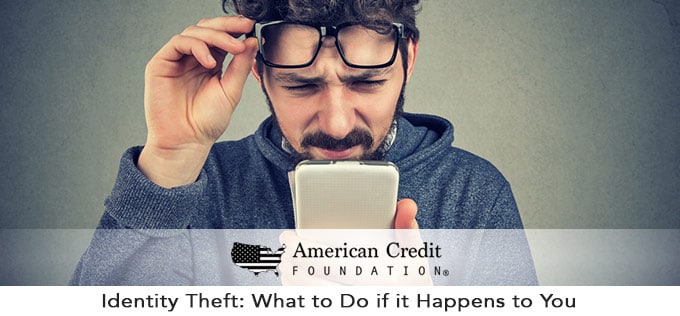
Perhaps it starts with a phone call from a debt collector, demanding payment for purchases you don’t remember making on a credit card you don’t even have. Maybe you suddenly stop receiving your bank statements and credit card bills in the mail. Or possibly you notice that your checking account is suddenly short a few hundred dollars.
If you’ve been the victim of identity theft, one of these scenarios probably sounds familiar.
Few things are as stressful as finding out that your personal information has fallen into the wrong hands. Yes, it’s bad news. There’s no escaping that. But here’s the good news: There are steps you can take to keep the problem from getting worse – and to protect your finances, your credit, and your good name.
The first thing to do? Don’t panic. Take a deep breath.
And then, get down to business.
ID Theft Damage Control: Who to Notify, What to Do Next
When dealing with identity theft, time is of the essence: The sooner you start doing damage control, the better. Here are a few things you should do right away:
- Alert the three credit bureaus. Contact each credit reporting bureau (Equifax, Experian, and TransUnion) and let them know what happened. You should also consider requesting a credit freeze and a fraud alert, two measures that will help prevent the ID thieves from, say, opening any new credit cards or taking out loans in your name.
- Alert the authorities. Remember, identity theft is a crime, which means you should definitely get local and even federal agencies involved. File a report with the Federal Trade Commission (FTC) (click here for their this super-easy online reporting tool). File a report with your local police department, too. Keep copies of all reports and forms; this will help you establish a solid paper trail in case you need proof that you were the victim ID theft.
- Check your credit card statements. If you’re like most folks, you probably don’t pay as much attention to your monthly credit card statement as you should – and that’s exactly what ID thieves are counting on. A common tactic with scammers is to make a few “test purchases” on a stolen credit card, just to see what happens. After a few successful test runs, they’ll assume that you’re not paying attention – and they’ll start making larger purchases. The good news is that if you’re vigilant, you can catch them in the act: Look for transactions with unfamiliar retailers, and be especially mindful of very small purchases. Contact your credit card issuer if you spot anything that looks suspicious.
- Get your credit report. If you think you’ve been the victim of identity theft, it’s critical that you closely monitor your credit report. You can get your free credit report here. Look for new credit inquiries, strange credit card accounts, or unfamiliar loans. And be sure to notify the credit bureau immediately if you suspect fraud (and if you haven’t set up a fraud alert or credit freeze, do it now)!
- Close fraudulent accounts. If a scammer did manage to open a new account or take out a loan using your information, you’ll want to close them ASAP! Contact the company or financial institution, explain what happened, and request that the account be closed or frozen until the matter is settled. The FTC has a helpful template here if you need to file the request in writing,
Be Proactive: Preventing Future ID Theft Incidents

Once you’ve taken care of the immediate threat, you can take steps to reduce your chances of being victimized a second time. Here are a few things you can do to protect yourself:
- Commit to changing your passwords regularly. Security experts recommend changing your passwords every few months. It’s easy to become complacent about this, especially if you have a lot of passwords to change – but sticking to a regular password-changing schedule can make it more difficult for would-be hackers to access your accounts.
- Be safe when shopping online. By following a few basic precautions, you can help keep your credit and debit card information from falling into the wrong hands. Avoid shopping on unsecured websites (look for URLs that start with “https,” not “http” – the “s” at the end stands for “secure”). And be careful with unsolicited emails from retailers – especially if they offer free gift cards or reference purchases you don’t remember making.
- Check card readers for skimmers. Credit card skimming involves fitting a phony card reader, fake keypad, or hidden camera over a machine with a card reader (think ATM machines, gas pumps, etc.). Skimming devices collect and store credit card information and PIN numbers, which thieves can then use or even sell to make a profit. Before swiping your card, check for any signs of skimming devices. A few red flags to watch for: parts that appear to be loose or crooked; parts that are a slightly different color than the rest of the machine; or any signs of damage around the card reader or keypad. If you have any doubts, pay inside.
- Keep a close eye on your accounts and your credit. Everyone should do this, of course – but it’s especially important for folks who have been victims of identity theft. Be extra-vigilant about reading your statements, and don’t be afraid to contact your bank or lender if you see anything that doesn’t appear to be on the up-and-up. You can always reinstate a credit freeze or fraud alert for extra protection.
- Clean out your wallet. There’s no reason to carry ALL of your credit cards with you every time you leave the house. Same goes for your Social Security card, ATM card – you get the idea. Take only what you need and leave the rest at home in a secure place.
Identity theft can happen to anyone – and there’s no such thing as being too careful when it comes to protecting your personal information. Remember, if you’ve got questions about finance – from paying down debt to rebuilding your credit score after a security incident – the friendly folks at American Credit Foundation are always here for you.